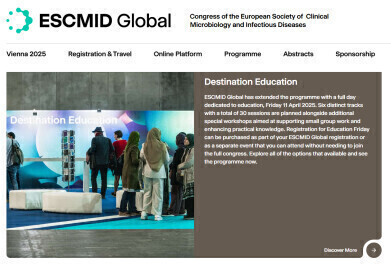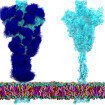-
 Credit: ESCMID Global 2025
Credit: ESCMID Global 2025
Research news
Respiratory syncytial virus increases risk of death in adults nearly threefold
Apr 11 2025
Major study shows that adults with respiratory syncytial virus-associated acute respiratory infection face a 2.7-fold higher risk of death within a year
Research presented at ESCMID Global 2025, in Vienna, Austria, on 11 April 2025 has found that adults have a 2.7-times higher risk of death – within one year – when compared to the general population, following infection by respiratory syncytial virus-associated acute respiratory infection (RSV-ARI).1
RSV-ARI is a group of illnesses caused by respiratory syncytial virus – a common and highly contagious virus – which primarily affect the respiratory tract.2 Infection in adults can lead to serious complications, which include pneumonia and chronic respiratory disease, particularly among those with underlying conditions such as chronic obstructive pulmonary disease (COPD) and asthma.3 Despite these risks, its effect on adults remained poorly understood.
RSV is a major respiratory virus that is common over the northern hemisphere winter period, typically peak circulation being between November to February. In the UK it accounts for around 30,000 hospitalisations of children under 5 annually and can also be severe in older adults, causing pneumonia and exacerbating existing lung disease. It causes around 9,000 hospitalisations in those aged more than 75 years in the UK each year.
In this Danish study, a nationwide cohort study the research team analysed data from 5,289 adults – 18 years and above – who had been diagnosed with RSV-ARI between 2011 and 2022 and matched them to 15,867 control subjects from the general population. Both clinical and economic outcomes were assessed up to 365 days following RSV-ARI onset.
‘Low-sugar’ vaccine offers broad coronavirus variants immunity
Being sugar-coated doesn’t just help the medicine go down, as the song goes, but it can also help a virus evade the immune system. However, researchers have now developed a universal vaccine th... Read More
While the study found that adults exposed to RSV-ARI had increased risk of death, they also experienced significantly worse overall health outcomes. In the follow-up period, the researchers recorded exacerbations of COPD (3.1 times more frequent) and asthma (4.6 times more frequent) in RSV-ARI patients. Also, RSV-ARI patients had rates of hospitalisation which were more than double of the control group (57% versus 28%), and intensive care unit admissions were nearly four times higher (5.3% versus 1.4%).
The RSV-ARI economic cost to health care providers was also notable raised, with direct costs for RSV-ARI patients during the 365-day follow-up amounted to an average of €20,181, which was more than twice that spent on healthcare for individuals within the control group, at €8,085.
“One of the most striking findings … was the prolonged and significant impact of RSV-ARI”, said Dr. Maria João Fonseca, lead study author.
“Even after the acute phase, patients continued to experience worse outcomes compared to the general population. This underscores just how serious and enduring the effects of RSV-ARI can be.”
“Exacerbations of COPD and asthma were the most common adverse clinical outcomes. These pre-existing conditions are already challenging in themselves, and RSV-ARI exacerbates their severity. Because of this, it’s crucial that we pay closer attention to patients with these underlying conditions to prevent further, potentially life-threatening complications.”
Commenting on the measures needed to reduce the impact of RSV-ARI, co-author, Dr. Stanislava Bratković commented: “Vaccination has proven highly effective in preventing severe outcomes from RSV. Given the significant burden of RSV-ARI highlighted by our study, prioritising vaccination for vulnerable populations is essential to reduce both health complications and associated costs.”
“Looking [ahead], we hope our findings will inspire further research into the broader clinical and societal burden of RSV, particularly in high-risk groups. This will help shape more targeted preventive strategies and ensure timely interventions for those who need it most,” she concluded.
The first vaccine for RSV approved by the European Medicines Agency (EMA) was ‘Arexvy’ developed by GSK and received its marketing authorisation (MA) license in June 2023. In August of 2023, Pfizer received MA approval from the EMA for ‘Abrysvo’ and the following August 2024, Moderna Biotech gained its MA for ‘mResvia’, all for use in patients over 60 years. Although Abrysvo is also approved for use: “in pregnant persons to protect the infant from birth to 6 months of age”.
- The study presented at ESCMID was funded and sponsored by GSK.
References
1. Fonseca, M. J., Bratković, S., et al. (2025). Clinical and economic burden of respiratory syncytial virus in adults with acute respiratory infections – a Danish nationwide cohort study. Oral presentation. ESCMID Global 2025.
2. Mayo Clinic. (2023). Respiratory syncytial virus (RSV): Symptoms and causes. https://www.mayoclinic.org/diseases-conditions/respiratory-syncytial-virus/symptoms-causes/syc-2035309
3. DeMartino, J. K., Lafeuille, M.-H., et al. (2023). Respiratory syncytial virus–related complications and healthcare costs among a Medicare-insured population in the United States. Open Forum Infectious Diseases, 10(5), ofad203. https://doi.org/10.1093/ofid/ofad203
About the European Society of Clinical Microbiology and Infectious Diseases
The European Society of Clinical Microbiology and Infectious Diseases (ESCMID) is the leading society for clinical microbiology and infectious diseases in Europe. ESCMID is proud to unite over 12,000 members as well as 45,000 affiliated members through 77 national and international affiliated societies. ESCMID’s mission is to champion medical progress in infection for a healthier tomorrow and plays an important role in emerging infectious diseases and antimicrobial resistance education and research. Website: www.escmid.org
Related articles
https://link.springer.com/article/10.1007/s41669-025-00565-3
https://www.tandfonline.com/doi/full/10.1080/21645515.2025.2479334
Digital Edition
Lab Asia Dec 2025
December 2025
Chromatography Articles- Cutting-edge sample preparation tools help laboratories to stay ahead of the curveMass Spectrometry & Spectroscopy Articles- Unlocking the complexity of metabolomics: Pushi...
View all digital editions
Events
Jan 21 2026 Tokyo, Japan
Jan 28 2026 Tokyo, Japan
Jan 29 2026 New Delhi, India
Feb 07 2026 Boston, MA, USA
Asia Pharma Expo/Asia Lab Expo
Feb 12 2026 Dhaka, Bangladesh



















